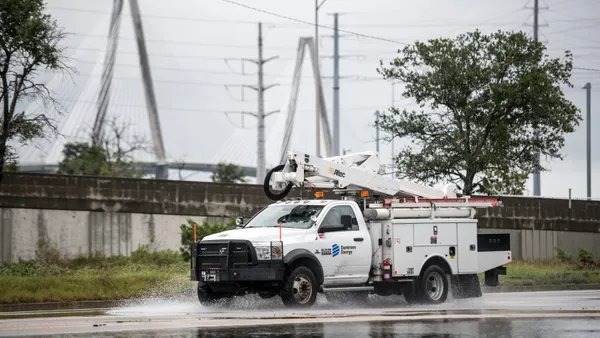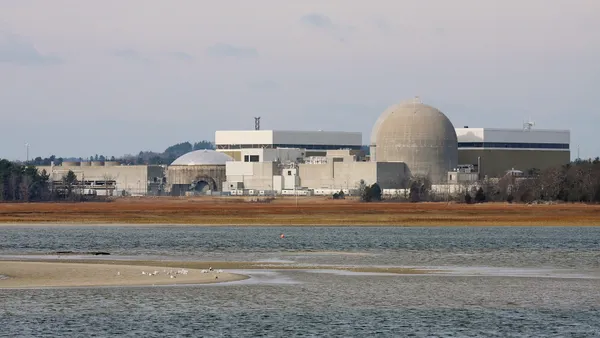Dive Brief:
- Maryland Attorney General Brian Frosh (D) filed a strongly-worded brief with the state's Public Service Commission urging the utility regulators to deny the proposed merger of Exelon and Pepco Holdings. The submission is a setback for Exelon, which has submitted an enhanced merger benefits package to Maryland regulators this week.
- The document, written on behalf of the State of Maryland and the Maryland Energy Administration, argues that ratepayers would not be "better off" if the merger was approved. "The only significant benefits accrue to Exelon and PHI shareholders and corporate officers — not the State or Maryland customers," the brief reads.
- Exelon and Pepco Holdings have increased the value of the Maryland customer investment fund to $94.4 million from $40 million in hopes of convincing state regulators the deal is in the best interest of consumers. In a filing with the Public Service Commission, the companies also enhanced their commitment to reduce the frequency and duration of power outages in Maryland.
Dive Insight:
In a surprise filing with the state's utility regulators, Maryland Attorney General Brian Frosh urged rejection of Exelon's acquisition of Pepco, which would create the largest utility in the country. Opponents of the merger say the filing is a strong indication that Maryland may not approve it.
"This merger will harm Maryland customers, offers no tangible, incremental benefits of sufficiently meaningful value, and is not in the public interest," the document's conclusion reads. "Nothing in the filed testimony, or the evidence adduced during lengthy and comprehensive hearings, changes these facts."
Frosh's filing argues that the proposed merger would open Maryland ratepayers up to undue risk, expose them to anti-competitive harms not addressed by the merger application, and threaten the growth of renewables and distributed energy, among other consequences. Frosh also argues that the companies have not presented compelling plans to mitigate the possible harms:
"The proposed acquisition introduces substantial potential harms to Pepco and Delmarva customers and to the State as a whole, which are not subject to meaningful mitigation,” the brief reads.
Observers close to the negotiations in the District of Columbia tell Utility Dive that the unexpected filing could influence regulators in the D.C., who also have yet to approve the merger. The deal has faced some stiff opposition in the District, with many complaints in the brief similar to those of anti-merger activists in the city, which Utility Dive reported on in January. On Friday, D.C. Councilmember Mary Cheh (D-Ward 3) came out against the merger, which she said would beget higher costs for ratepayers.
Exelon, for its part, says it is encouraged by a "number of parties" that have included constructive comments and criqtiques of the merger.
"On the other hand," a spokesperson wrote to Utility Dive, "a few parties have taken a 'just say no' position, without considering the tangible, long-term benefits that this merger offers."
Exelon and Pepco more than doubled the value of the Maryland customer investment fund in a bid to sweeten their merger proposal with Maryland regulators this week. State regulators will determine how best to utilize for of the funds for customer benefits, such as rate credits, energy efficiency or low income customer assistance.
The companies said its commitments provide an upfront customer benefit that is 2.4 times the value of the companies’ original proposal. In addition to the near-term benefits, they said another $127.2 million in projected net merger savings over 10 years, and more than $17 million per year every year thereafter, will flow back to Pepco and Delmarva Power’s Maryland customers through rates lower than they would be absent the merger.
If approved, the merger would bring together Exelon’s three electric and gas utilities – BGE, ComEd and PECO – and Pepco Holdings’ three electric and gas utilities – Atlantic City Electric, Delmarva Power and Pepco – to create the leading Mid Atlantic electric and gas utility.
The merger has already been approved in New Jersey and Virginia, as well as winning support from FERC. A recent Delaware settlement is expected to help push the deal through in that state as well.
But in the District of Columbia, the deal may have hit a temporary snag.
Similar to the Maryland filing, the companies recently submitted an enhanced package of merger benefits for District of Columbia ratepayers in an attempt to sway support. Like the Maryland filing, the larger benefits more than doubled the initial package.
RTO Insider reports that the D.C. Office of People’s Counsel has called the new filing a “procedural mess" and has asked for a delay in the proceedings. The new filing does not indicate the differences between the original and updated offers, the advocate said.
Responses are due in less than two weeks, but OPC has asked for an extension into April.













